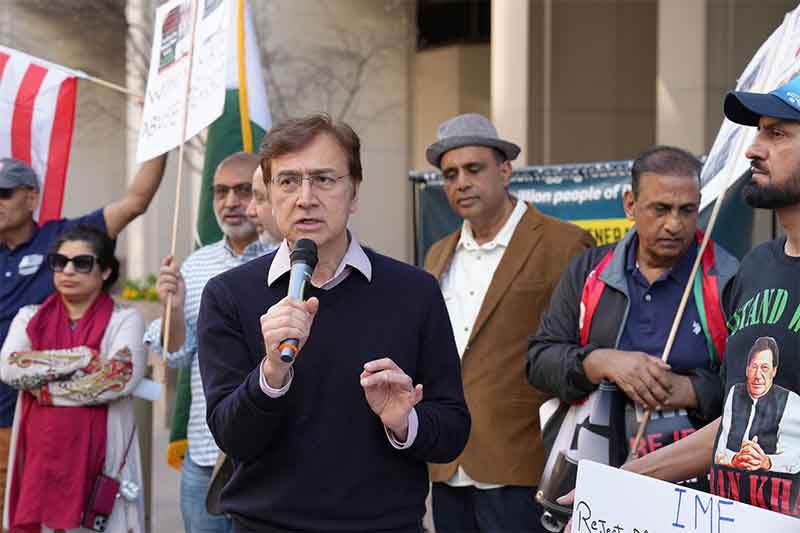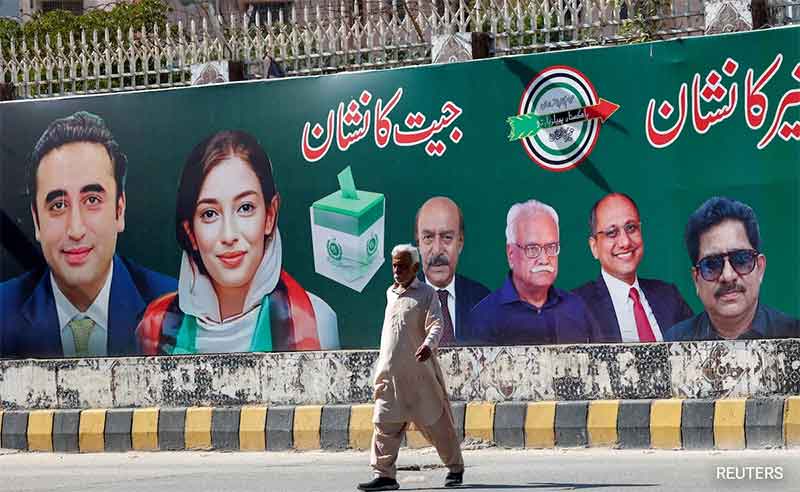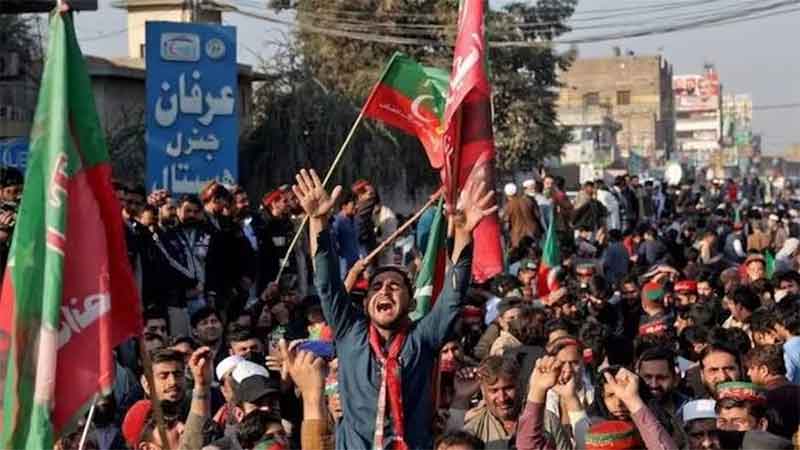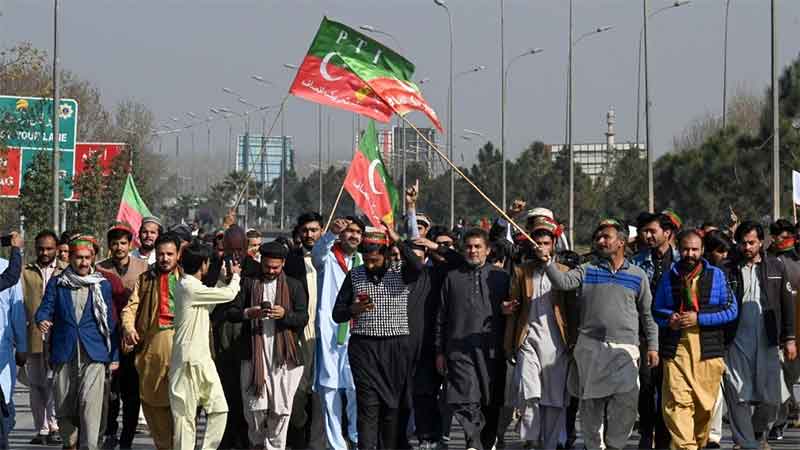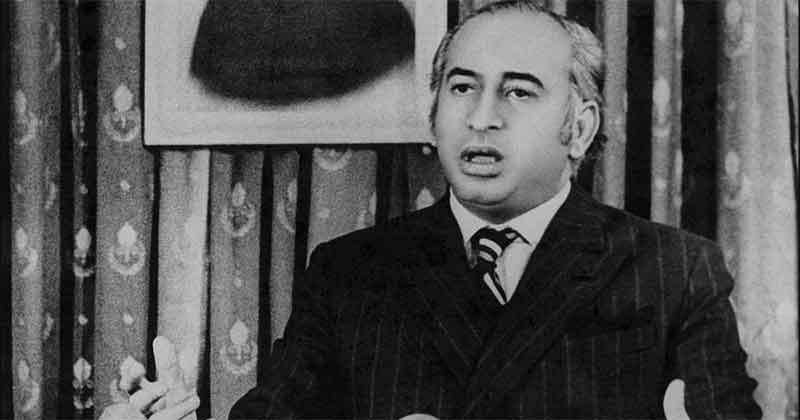
Pakistan’s Supreme Court ruled on Wednesday that the country’s former Prime Minister Zulfikar Ali Bhutto, who was hanged 44 year ago after being convicted of murder, did not get a fair trial.
Zulfikar Ali Bhutto, the founder of the Pakistan Peoples Party (PPP) now run by his grandson and former foreign minister Bilawal Bhutto Zardari, was hanged in 1979 after a trial under the military regime of late General Zia-ul-Haq, the military ruler who pushed Islamist hardliners into dominating position in all areas of the country, imposed harsh Islamist rules, and wiped away all traces of modern education and culture. The military ruler became the main partner in CIA’s proxy war in Afghanistan, which CIA organized against the left leaning government in Kabul implementing progressive measures in Afghanistan society, and the military ruler’s main political backer was Jamate Islami Pakistan.
A Reuters report said:
‘”We did not find that the fair trial and due process requirements were met,” said Pakistan’s Chief Justice Qazi Faez Isa in remarks telecast live of the ruling that he said was a unanimous decision by a nine-member bench headed by him.’
The country’s newly appointed Prime Minister Shehbaz Sharif hailed the ruling. “It is a positive development that a wrong done by a court has been corrected by a court,” he said in a statement from his office.
The Reuters report said:
‘The ruling came in response to a judicial reference filed by Bhutto Zardari’s father, Asif Ali Zardari, during his tenure as president in 2011. It sought an opinion by the top court on revisiting the death sentence awarded to the PPP founder.
‘”Our family waited 3 generations to hear these words,” Bhutto Zardari said later in a post on X, formerly known as Twitter.
‘The court will issue a detailed order later.
‘”It is an admission of colossal miscarriage of justice under Zia’s martial law regime,” said Yousuf Nazar, London-based political commentator and a close aide of the late Benazir Bhutto, Zulfikar Ali Bhutto’s daughter and also a former prime minister. She was assassinated in 2007.
‘Rights groups say Haq’s 11 years of dictatorship were marked by an assault on democracy, persecution and jailing of PPP workers and public flogging of opponents and critics.
‘Nazar said the regime also pushed the conservative Muslim nation into extremism and militancy by propping up and backing militant groups to fight a U.S. proxy war against the then Soviet Union in Afghanistan.
‘”It led to an unprecedented level of support for and patronage of religious extremists at the state level,” he said.’
A report by Pakistan’s one of the main newspaper The Dawn (Bottom of Form
SC says conditions of ‘fair trial, due process’ not met in Zulfikar Bhutto’s trial) said on March 6, 2024:
‘The Supreme Court on Wednesday observed that the trial under the 1979 judgment that sent former prime minister Zulfikar Ali Bhutto to the gallows did not meet the requirements of a “fair trial and due process”.’
The report said:
‘Headed by Chief Justice of Pakistan (CJP) Qazi Faez Isa, a nine-judge bench announced its much-anticipated opinion on the long-pending presidential reference to answer whether it can revisit its verdict, which the PPP and jurists regard as a historic wrong.
‘Headed by CJP Isa, the larger bench consisted of Justice Sardar Tariq Masood, Justice Syed Mansoor Ali Shah, Justice Yahya Afridi, Justice Amin-ud-Din Khan, Justice Jamal Khan Mandokhel, Justice Muhammad Ali Mazhar, Justice Syed Hasan Azhar Rizvi and Justice Musarrat Hilali.
‘The proceedings were broadcast live on the Supreme Court’s website and YouTube channel.’
The Dawn’s report said:
‘Announcing the unanimous opinion, CJP Isa said, “The proceedings of the trial by the Lahore High Court and of the appeal by the Supreme Court of Pakistan do not meet the requirements of the fundamental right to a fair trial and due process enshrined in Articles 4 and 9 of the Constitution, and later guaranteed as a separate and fundamental right under Article 10A of the Constitution.”’
The Pakistan Supreme Court acknowledged that there had been “some cases in our judicial history that created a public perception that either fear or favor deterred the performance of a duty to administer justice in accordance with the law”.
The report said:
‘“We must therefore be willing to confront our past missteps and fallibilities with humility, in the spirit of self-accountability, and as a testament to our commitment to ensure that justice must be served with unwavering integrity and fidelity to the law,” Justice Isa said.
‘“We cannot correct ourselves and progress in the right direction until we acknowledge our past mistakes,” he added.
‘The CJP stated that the SC was empowered to render an opinion on any “question of law” of public importance under Article 186 of the Constitution.
‘The chief justice said that the reference provided an opportunity to “reflect upon the proceedings of the trial, conviction and death sentence of Mr Bhutto under the regime of military dictator General Ziaul Haq”.
‘He recalled that the reference was filed during the government of the PPP and that the successive governments of other major political parties “carried forward this inquiry and did not opt to withdraw the reference, which included the […] caretaker government”.
‘Noting that the reference had asked five questions, the CJP read out the opinion to one of those: “The Constitution and the law do not provide a mechanism to set aside the judgment whereby Bhutto was convicted and sentenced.”
‘Referring to a question asked on the principle of law, the SC said, “Referenced questions do not specify the principle of law enunciated by this court in the Zulfikar Ali Bhutto case, regarding which our opinion is sought. Therefore, it cannot be answered whether any principle of law enunciated in Zulfikar Ali Bhutto case has been dissented to or overruled”.
‘On the question of whether the awarding and maintaining of the death sentence was “justified or could amount to deliberate murder”, CJP Isa observed: “This court cannot reappraise the evidence and undo the decision of the case. However, in our detailed reasons, we shall identify the major constitutional and legal lapses that had occurred with regard to fair trial and due process.”
‘About the matter of Islamic injunctions, the apex court said it would not render any assistance on the question. “Therefore, it would be inappropriate to render an opinion on the Islamic aspects,” it added.’
BHUTTO FAMILY, LAWYERS, HAIL HISTORIC OPINION
The Dawn’s report said:
‘As the opinion was read out, the late Bhutto’s grandson, Bilawal Bhutto-Zardari — clad in a black shalwar kameez and dark blue jacket — solemnly stood alongside his lawyer Farooq H. Naek and Raza Rabbani, and could be seen wiping his face with a handkerchief.
‘He later emerged from the courtroom with sunglasses on and briefly spoke to reporters. The PPP chairman called the court’s views “historic”, adding that they were awaiting the detailed opinion.
‘He hoped that, 44 years later, the SC’s opinion would allow Pakistan to progress, and that the “system” would finally be put on the right path.’
It said:
‘In a post on X, Bilawal noted that the SC’s opinion came “44 years after judicial murder and more than 12 years after [the] presidential reference was filed”.
“The pursuit of justice was a labour of love by President Asif Ali Zardari in the name of his wife Shaheed Mohtarma Benazir Bhutto. Our family waited 3 generations to hear these words.”’
It said:
‘Aseefa Bhutto-Zardari said her grandfather’s “blood stains the steps of the Supreme Court”.
‘In a post on X, she called it “a permanent reminder of the grave injustice that weighs heavily on those hallowed halls”. “Over four decades later, justice has finally prevailed,” Aseefa added.’
CASE HISTORY
According to the report by The Dawn,
‘In March 1979, nearly two years after the Bhutto’s government’s ouster by the then-military dictator Gen Ziaul Haq, a seven-judge Supreme Court (SC) bench, in a split four-three verdict, upheld the Lahore High Court’s (LHC) verdict awarding death sentence to the former premier.
‘In April 2011, then-president Zardari filed a reference under Article 186 (1 and 2) of the Constitution, which empowers the president to refer any question of public importance to the apex court to seek its opinion on any matter.
‘On Oct 9, 2018, Bilawal requested the SC to allow him to become a party in the case, stating that Bhutto was brutally executed as a consequence of a stroke of a pen, the 10-page application drafted by Naek stated.
‘In December last year, the apex court took up the reference, regretting the delay in the fixing of the same. In January, the PPP had submitted additional evidence consisting of transcripts and video recordings of various interviews.
‘In a subsequent hearing, the SC observed it could revisit its earlier judgments if it is established that a great miscarriage of justice occurred due to the departure from the Constitution or political elements in the prosecution.
‘Senior counsel Makhdoom Ali Khan, appointed amicus curiae by the court, had said the present matter was a unique case in the common law jurisdiction where a judge, who was part of the narrowest majority of the bench, gave an interview much after his retirement.
‘In its Feb 21 hearing, CJP Isa wondered whether revisiting the case would enhance the reputation of the armed forces and “heal the wounds” of the nation. Justice Jamal Khan Mandokhel observed this could be an opportunity to put an end to interference in court matters from outside.
‘The apex court also found it “inappropriate” of then-LHC chief justice Mushtaq Hussain to ask the then-Justice Dr Nasim Hasan Shah to sit in the SC bench hearing the challenge to his order of awarding death to Bhutto.
‘‘During another hearing, retired SC Justice Manzoor Malik pointed out harrowing illegalities in the ex-PM’s trial. Justice Sardar Tariq Masood deplored that it was quite clear that there was no order of confirmation of the death sentence by the high court.
‘Continuing his arguments as amicus curiae, Justice Malik had urged the top court to rectify the miscarriage of justice or simply brush it aside on technical grounds.
‘During the closing of the reference hearing on Monday, CJP Isa had observed that the court would announce a short order on the reference in a couple of days after consultation since one of the bench members, Justice Sardar Tariq Masood, is retiring soon.
‘Ahmed Raza Qasuri, on whose complaint the murder case was registered against former PM Bhutto, pointed out that the court had not crossed the hurdle of admissibility of the reference and feared that any opinion by the apex court would open up the floodgates of references inundating the court with a tsunami of cases like the Jan 13 denial of ‘bat’ symbol to the PTI.’

